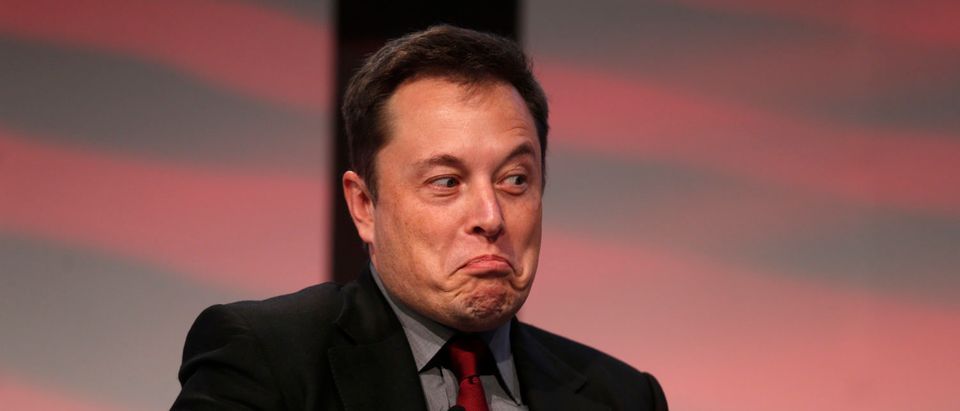- Removing the cap on General Motors’ electric vehicle tax credits could cost taxpayers billions of dollars over the next decade, a DCNF analysis finds.
- This comes amid reports that such a move would also hurt people’s personal income levels.
- If Tesla and GM continue getting electric vehicle tax credits without any caps, then taxpayers will likely feel the pain.
Taxpayers are on the hook for roughly tens of billions of dollars over a decade if lawmakers eliminate a cap on electric vehicle tax credits, according to a Daily Caller News Foundation analysis.
There are more than 400,000 electric vehicles sold in the U.S. every year, according to some reports. If lawmakers nix the current cap electric vehicle makers enjoy, and the number of vehicles sold over the next decade remains constant, then taxpayers will get hit with a $30 billion bill.
That number might be a conservative estimate as sales of electric vehicles in 2016 and 2017 increased by 36 percent and 26 percent, respectively. Democrats introduced a bill in July that would, if passed, remove the cap and replace it with a 10-year limit. The GOP has etched out a different position.
The current limit is 200,000 qualifying vehicles — extending the credit through 2022 will cost roughly $7.5 billion, according to the Congressional Research Service.
But if that cap is eliminated and automakers continue producing 400,000 vehicles per year, then companies like General Motors and Tesla, among others, will make roughly 4 million cars over ten years. The DCNF multiplied that number by $7,500 to determine the cost to taxpayers over the period.
Republican Sen. John Barrasso of Wyoming introduced a bill in October that would end the $7,500 federal tax credit for electric cars altogether and even tax them more. Recent reports suggest lifting the cap would hurt Americans who are struggling to stay ahead of their finances.
Eliminating the cap would cause personal household income to fall $610 per household between 2020 and 2035, the NERA Economic Modeling noted in a report published Monday. It would also benefit wealthy Americans more than low-income earners.
General Motors and Tesla are two of the largest automakers seeking an extension of tax credits for those purchasing electric vehicles. GM helped create the so-called EV Drive Coalition on Nov. 13 as the two car makers approach the cap of 200,000 vehicles per manufacturer before the credits phase out.
The $7,500 tax credit will drop starting Jan. 1, 2019, to $3,750 around mid-year, according to Tesla’s website. GM is entering a similar stage — it is expected to hit the 200,000 vehicle point with sales of its Chevrolet Bolt EV, among other vehicles.
President Donald Trump might disrupt their carefully laid out plans. Trump blasted GM in November for laying off thousands of employees as the company prepares to ramp up its electric vehicle production. (RELATED: GM’s Mass Layoff Includes Eliminating A Hybrid Car Obama Once Championed)

US President Donald Trump and First Lady Melania Trump attend a Hanukkah reception with Holocaust survivors in the East Room of the White House on December 6, 2018 in Washington,DC. (PBRENDAN SMIALOWSKI/AFP/Getty Images)
“Very disappointed with General Motors and their CEO, Mary Barra, for closing plants in Ohio, Michigan and Maryland. Nothing being closed in Mexico & China,” Trump wrote in a Nov. 27 tweet. “The U.S. saved General Motors, and this is the THANKS we get! We are now looking at cutting all @GM subsidies, including…. for electric cars.”
The degree to which Tesla and GM rely on tax credits is also complicating matters. Data show the elimination of the tax credit could seriously hobble Tesla, especially considering the company’s inability to mass produce vehicles at the scale of its larger competitors.
A data analysis from the Wall Street Journal conducted in July shows that there were no new Tesla Model S sedans and Model X SUVs registered in Hong Kong the month after that country revoked the tax credit.
There were 2,939 Tesla vehicles registered in March before the April 1 redaction of the credit, according to the WSJ, and nearly 3,700 entering the department’s books for the first quarter of 2017. The end of the tax break was announced in February.
All content created by the Daily Caller News Foundation, an independent and nonpartisan newswire service, is available without charge to any legitimate news publisher that can provide a large audience. All republished articles must include our logo, our reporter’s byline and their DCNF affiliation. For any questions about our guidelines or partnering with us, please contact licensing@dailycallernewsfoundation.org.


